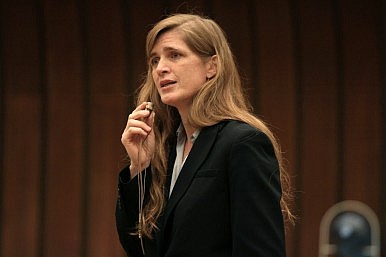Surprisingly, Power devotes a noticeable part of her remarks to Sri Lanka, a small island nation in the Indian Ocean that’s still recovering from a twenty-six year civil war that some suggest left 80,000 to 100,000 dead.
Here’s Power towards the end of her speech:
The experience of Sri Lanka, I think, embodies so much of what is at stake in this enterprise. It shows us the profound costs of impunity and corruption. It shows how a determined and persistent civil society that would not give up can swing the pendulum back toward greater accountability and transparency. And it shows how much leaders can achieve, even in a short period of time, when they are willing to engage the people they serve.
To her credit, she adds a dose of realism in the following paragraph when she mentions “all the challenges that lie ahead.” Nonetheless, it’s still peculiar that a speech like this would have referenced Sri Lanka in such detail.
Since the newly elected President Maithripala Sirisena came to power in January, Colombo has made a multitude of promises, including on the transitional justice front, although much remains to be done.
Power’s days as a journalist seem so far away. She reported from various global hotspots and authored several books, including “A Problem From Hell”: America and the Age of Genocide. In the book, Power criticizes American foreign policy and recounts how, over the years, the U.S. government has consistently looked the other way or failed to act resolutely when mass atrocities take place, among other claims.
Sri Lanka’s civil war ended in 2009. There are a range of opinions about how many people died during the war’s final phase, when the Sri Lankan government militarily crushed the Tamil Tigers, a ruthless separatist group that was fighting for a separate Tamil state in the northern and eastern parts of the country. That said, there’s now little doubt that there were massive civilian casualties. A recently concluded U.N. investigation has documented horrific abuses including extrajudicial killings, sexual violence and torture.
The unexpected ouster of former president Mahinda Rajapaksa has meant that America’s Sri Lanka policy has been evolving. Power’s optimistic take had already been iterated by several senior officials in Barack Obama’s administration (and Obama himself), and was prominently on display when U.S. Secretary of State John Kerry visited the country in May and delivered a speech in Colombo, the capital.
It’s been more than ten months since Sirisena came to power; now would be an opportune time for the U.S. to recalibrate its rhetoric on Sri Lanka. That said, if Washington is going to continue to embrace the Sirisena administration and perhaps even look the other way on accountability – punishing perpetrators for crimes committed during the war, possibly including war crimes – then the U.S. may feel compelled to continue building up a specious narrative of progress.
The reality is that it’s not clear how sincere the new government really is about embracing transparency, accountability or deeper reforms. Besides, if we’re using the last days of the increasingly authoritarian Rajapaksa regime as a reference point, then asserting that things have improved isn’t saying all that much.
There have been a few steps in the right direction and Sirisena probably won’t rule as autocratically as Rajapaksa did. That said, there are many areas where things are not changing that much, or where aspects of the reform agenda remain largely incomplete. Let’s take the numerous corruption investigations as an example. Many people, including this writer, must be wondering if these investigations are on a road to nowhere. Corruption was a huge problem when Rajapaksa was in power and this was a major campaign issue during the presidential and parliamentary elections. It’s unfortunate that there’ve been few indictments and little accountability in this area.
With American foreign policy being criticized from both the left and the right, the Obama administration wants to put Sri Lanka’s recent transfer of power in the win column for U.S. democracy promotion efforts. Nonetheless, it’s imperative that the administration make honest, accurate assessments about Sri Lanka’s progress. The truth is that nobody really knows the lasting significance of Sirisena’s ascension and we won’t know for some time. Suggesting otherwise undermines U.S. credibility and could complicate future efforts to encourage change in complicated, post-war countries.
